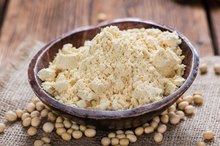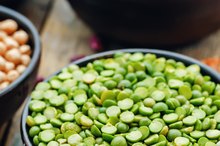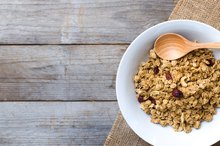Are Edamame Beans Healthy for Women?
Edamame, which are fresh green soybeans, can be a healthy addition to a woman's diet. The Academy of Nutrition and Dietetics states that soy products, such as edamame, are the only plant-based protein sources comparable in quality to eggs and meat. Soy foods may also provide some health benefits, such as potentially lowering your risk for heart disease, osteoporosis and cancer.
Nutrition Facts
A 1-cup serving of edamame beans contains 189 calories, 16.9 grams of protein, 8.1 grams of fat and 15.4 grams of carbohydrates, including 8.1 grams of fiber, or 32 percent of the daily value. Fiber helps lower your risk for heart disease, high cholesterol and digestive complaints, such as constipation. A 1-cup serving of these beans also provides at least 10 percent of the DV for many essential vitamins and minerals, including calcium, iron, manganese, magnesium, phosphorus, potassium, zinc, copper, vitamins C and K, thiamine, riboflavin and folate, making them a very nutrient-dense food choice.
Heart Health
The Benefits and Drawbacks of Soy Protein Powder in Women
Learn More
Animal-based protein sources tend to be high in fat, saturated fat and cholesterol, all of which can increase your cholesterol levels and heart disease risk. Trading these foods for soy protein at least some of the time may improve your heart health. A meta-analysis published in "The American Journal of Cardiology" in September 2006 found that eating more soy protein may help increase your high-density lipoprotein, or "good" cholesterol, while decreasing your total cholesterol, triglycerides and low-density lipoprotein, or "bad" cholesterol, with the degree of change increasing as the amount of soy protein you eat increases.
Obesity Risk
Being overweight or obese increases your risk for a number of health problems, including heart disease and diabetes. Eating foods containing soy protein, such as edamame, as part of a low-calorie diet may help you maintain a healthy weight or even lose weight, according to an article published in the "International Journal of Medical Science" in 2007.
Osteoporosis Risk
Symptoms of Allergies to Chickpeas and Soy
Learn More
Women tend to be at higher risk for osteoporosis as they get older. Eating approximately 40 grams per day of soy protein from foods such as edamame may help increase your bone density, and lower your risk for osteoporosis, according to the University of Maryland Medical Center. A study published in the "Journal of Clinical Densitometry" in 2011 found that compounds in soy called isoflavones may help limit bone loss in postmenopausal women.
Cancer Risk
Although some animal studies showed a potential for an increased risk of breast cancer with soy consumption, studies in people haven't shown any increased risk, and some studies have shown a benefit, according to an article by registered dietitian Marji McCullough published on the American Cancer Society website in 2012. A meta-analysis published in "PLOS ONE" in February 2014 came to a similar conclusion, with the authors stating that in Asian countries soy consumption may decrease breast cancer risk, but in Western countries there isn't a link between soy consumption, either before or after menopause, and breast cancer.
Related Articles
References
- Health-Alicious-Ness.com: Nutrition Facts Comparison Tool
- American Cancer Society: The Bottom Line on Soy and Breast Cancer Risk
- University of Maryland Medical Center: Soy
- Journal of Clinical Densitometry: The Soy Isoflavones for Reducing Bone Loss (SIRBL) Study: Three Year Effects on pQCT Bone Mineral Density and Strength Measures in Postmenopausal Women
- The American Journal of Cardiology: A Meta-Analysis of the Effect of Soy Protein Supplementation on Serum Lipids
- International Journal of Medical Sciences: Role of Dietary Soy Protein in Obesity
- PLOS ONE: Association Between Soy Isoflavone Intake and Breast Cancer Risk for Pre- and Post-Menopausal Women: A Meta-Analysis of Epidemiological Studies
Writer Bio
Based in Massachusetts, Jessica Bruso has been writing since 2008. She holds a master of science degree in food policy and applied nutrition and a bachelor of arts degree in international relations, both from Tufts University.









